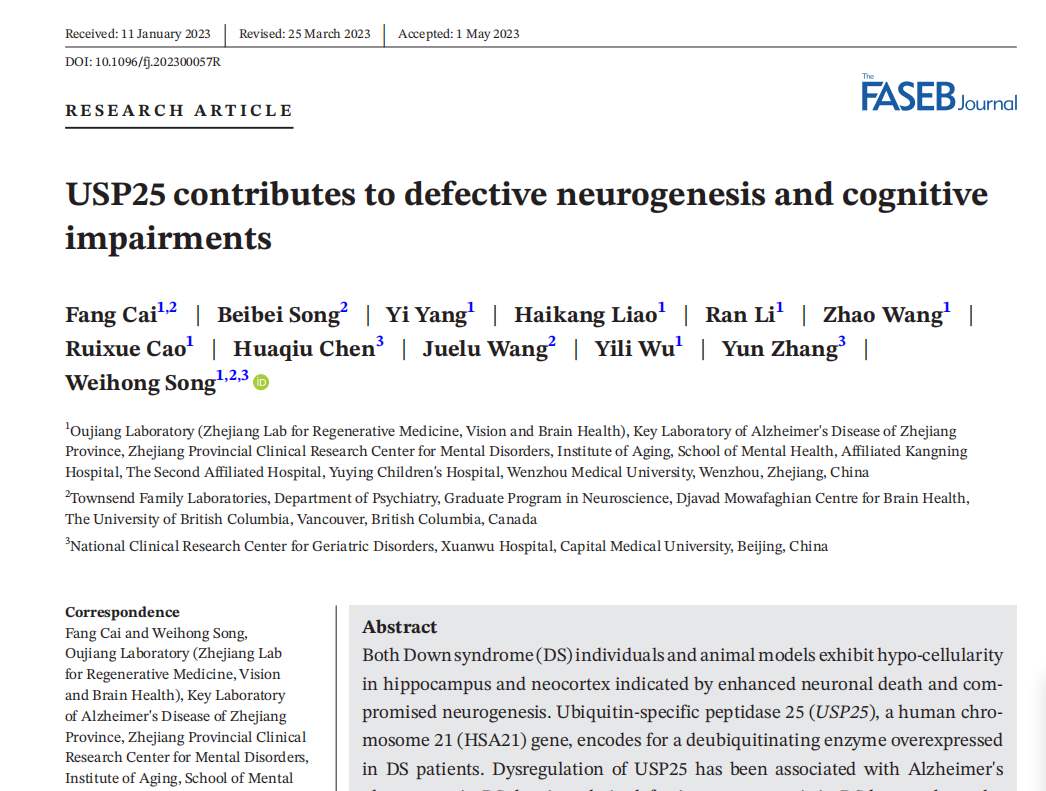The team of Academician Weihong Song revealed the underline mechanism of cognitive impairment caused by USP25 abnormality in Alzheimer's disease
Recently, the team of Weihong Song, Fellow of the Canadian Academy of Health Sciences (CAHS), director of Oujiang Laboratory and academic vice president of Wenzhou Medical University, published a paper "USP 25 Contributes to Defective Neurogenesis and Cognitive Impairments" in The FASEB Journal. They found USP25 overexpression resulted in defective neurogenesis and cognitive impairments, which could contribute to the pathogenesis of Down syndrome and Alzheimer's disease. This study indicates that USP25 may be a potential pharmaceutical target for Down syndrome and Alzheimer's disease.

Down syndrome (DS) is caused by total or partial triplication of human chromosome 21 (HSA21). Down syndrome is at greater risk for developing Alzheimer’s disease. Both DS brains and animal model show a reduced number of neurons in hippocampus and neocortex, meaning increased neuronal death and defected synaptogenesis. Ubiquitin-specific peptidase 25 (USP25), a human chromosome 21 (HSA21) gene, encodes for a deubiquitinating enzyme overexpressed in DS patients. In this study, they found that USP25 overexpression impaired cell cycle regulation proteins during embryonic neurogenesis and cortical development. The upregulation of USP25 promoted the neural stem cells to glial cell fates and suppressed neuronal cell fate by altering the balance between cyclin D1 and cyclin D2, thus reducing neurogenesis. USP25-Tg mice showed increased anxiety/depression-like behaviors and learning and memory deficits. This study provides novel insights and theories into the roles of USP25-induced defective neurogenesis and cognitive impairments in DS and Alzheimer's disease, suggesting its potential for the development of new diagnostic and therapeutic approaches for brain degenerative diseases.

This work is collaborated with Fang Cai and Yun Zhang. Fang Cai, the PI at Oujiang Laboratory, Yun Zhang, the PI at Xuanwu Hospital affiliated to Capital Medical University. Professor Weihong Song are the corresponding communication authors of this article. Oujiang Laboratory is the primary affiliation. This work is supported by the National Natural Science Foundation of China.
-
Wang Xu--Clinical and Translational Medicine: Deubiquitination of RIPK2 by OTUB2 augments NOD2 signalling and protective effects in intestinal inflammation.
SOURCE:/en/Research/249.html -
Song Weihong--Cell Death & Disease:NAD+-boosting agent nicotinamide mononucleotide potently improves mitochondria stress response in Alzheimer's disease via ATF4-dependent mitochondrial UPR.
SOURCE:/en/Research/248.html -
Chen YU -- Nano Today: NIR-II light-activated and Cu nanocatalyst-enabled bioorthogonal reaction in living systems for efficient tumor therapy.
SOURCE:/en/Research/247.html -
Su Jianzhong--Clinical And Translational Medicine: Distinct discrepancy in breast cancer organoids recapitulation among molecular subtypes revealed by single-cell transcriptomes analysis
SOURCE:/en/Research/246.html
CONTACT
Address:No. 999 Jinshi Road, Yongzhong Street, Longwan District, Wenzhou City, Zhejiang Province, China
Email:zh@ojlab.ac.cn
ZipCode:325000



